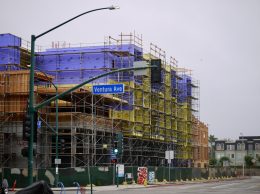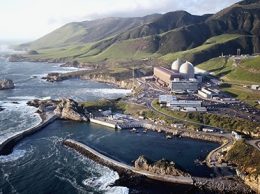California must invest in the future, Lt. Gov. says in SLO
Lt. Gov. Gavin Newsom told hundreds of civic and business leaders in San Luis Obispo on Feb. 24 that California needs to look beyond its borders for new ideas on how to once again lead the United States in job creation.
Newsom told the crowd at the San Luis Obispo Chamber of Commerce luncheon that he has studied both the manufacturing renaissance in the highly regulated German state of Bavaria to lightly regulated Texas, where the Democrat took a trip along with a delegation of Republican state officials.
“I cased other people’s joints,” Newsom told the crowd. “I’m sick of Rick Perry coming to California on hunting trips.”
Newsom – who was technically Gov. Newsom at the event, because he was the state’s acting chief executive while Gov. Jerry Brown was traveling out of state – said the clamor to fill budget gaps in recent years has obscured the larger structural problem of California grinding to a halt at mediocrity as a job-creation engine. From 1950 to 1980, California was the nation’s biggest creator of jobs. From 1980 to 2010, the state “flat-lined,” Newsom said, barely keeping up with national averages for job creation.
“Fundamentally, this state needs to get back into the future business,” Newsome said. “The job for all of us is not to get back to where we were 36 months ago – big deal. Our job is to get back to where were 36 years ago.”
Newsom was joined at the event by a host of panelists of different political persuasions, and all agreed that the heart of the state’s troubles are a broken revenue and expenditure structure perpetuated by partisan gridlock, some of which may be alleviated by redistricting and run-off primaries. But those reforms alone won’t break the cycle, said state Sen. Sam Blakeslee, a San Luis Obispo Republican who, like former Lt. Gov. Abel Maldonado of Santa Maria, has taken political heat for trying to reach bi-partisan compromises.
“Special interests have enormous influence” in Sacramento, Blakeslee said. “It’s tough for Republicans to break from powerful corporations and the utilities. It’s tough for my colleagues across the aisle to break from those involved in the labor community.”
Blakeslee pointed out that, while the Golden State’s elected officials squabble over decades-old talking points, hundreds of millions of people around the world are joining the middle class, and technology – much of it invented in California – is enabling them to compete with the state. “They’re working longer and harder, and we have not caught up in California,” Blakeslee said.
Fred Keeley, a board member at California Forward, a nonpartisan think tank advocating for better government accountability and outcome measures for government spending, said Sacramento needs a change on the order of 1911, when the state’s voters rose against the dominating railroad barons of the day to enact reforms such as ballot initiatives and the predecessor to the Public Utilities Commission.
The panelists at the event also commented on recent tax proposals, including a proposal intended for the November ballot from Gov. Brown. It would enact a four-year, half-cent sales tax increase and add one percentage point to income taxes for earners making more than $250,000.
George Soares, a lobbyist with the firm Kahn, Soares and Conway, said any tax increase will have a tough time passing because Californians have lost faith that the extra revenue will be spent responsibly. “We have government asking for more, but we don’t have the example of how government has handled things right,” Soares said.
Soares also said that business should not be asked to solve the state’s revenue problems. “They have the burden now,” he said. “Government needs to restore confidence. Businesses are carefully analyzing whether to they want to stay in California. They’re asking themselves, ‘Do we want to subject ourselves to California?’”
Blakeslee said business owners can do something to fight the state’s revenue problem. They can view the recession not as a downturn, but rather as a buyer’s market for talent. “Hire one new person,” Blakeslee said. “It’s psychological. It’s consumer confidence. Put a little risk capital in…hire one talented person.”
California State Controller John Chiang, who was also on the panel, pointed out that many of California’s problems are symptoms of the deeper ill of too much debt all around. Because consumers, government and Wall Street are all over leveraged, it makes it hard to invest in the three pillars of a healthy economy: human capital, financial capital and infrastructure.
“We are all over-leveraged,” Chiang said. “That is a road to a lower standard of living.”
Newsom said it’s not a viable strategy for California to offer huge corporate tax breaks and lower its environmental, safety and labor standards to attract jobs the way that some other states do. He said it’s more effective to make California a place for innovation that creates jobs that didn’t exist before rather than trying to poach existing jobs from another locale.
“We will never be the cheapest place to do business, but we will always be the best place to do business because of our productivity,” Newsom said.












